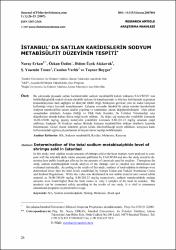| dc.contributor.author | Özden, Nuray Erkan | |
| dc.contributor.author | Özden, Özkan | |
| dc.contributor.author | Alakavuk, Didem Üçok | |
| dc.contributor.author | Tosun, Ş. Yasemin | |
| dc.contributor.author | Varlık, Candan | |
| dc.contributor.author | Baygar, Taçnur | |
| dc.date.accessioned | 2020-11-20T17:31:46Z | |
| dc.date.available | 2020-11-20T17:31:46Z | |
| dc.date.issued | 2007 | |
| dc.identifier.issn | 1307-234X | |
| dc.identifier.issn | 1307-234X | |
| dc.identifier.uri | https://app.trdizin.gov.tr//makale/TmpNek5qWTI | |
| dc.identifier.uri | https://hdl.handle.net/20.500.12809/7622 | |
| dc.description.abstract | Bu çalışmada piyasada satılan karideslerdeki sodium metabisülfit kalıntı miktarını FAO/WHO’ nun belirlediği günlük makul vücuda alınabilir miktarı ile karşılaştırmak ve böylece hali hazırda uygulanan konsantrasyonun halk sağlığını ne düzeyde tehdit ettiği, balıkçının gereksiz yere ne kadar kimyasal kullandığı ortaya koymak amaçlanmıştır. Çalışma sırasında İstanbul’da satışa sunulan karideslerde Sodyum metabisülfitin kalıntı analizi yapılmış ve istatistiksel olarak değerlendirilmiştir. Elde edilen sonuçlardan ürünlerin Avrupa Birliği ve Türk Gıda Kodeksi, Su Ürünleri Yönetmeliği sınır değerlerinin altında kalıntı ihtiva ettiği tespit edilmiş. Bu değer çiğ materyalin yenilebilir kısmında 36.00-350.00 mg/kg, pişmiş materyalin yenilebilir kısmında 8.80-281.23 mg/kg arasında tespit edilirken, haşlanan 36 örnekten sadece ikisinde Sodyum metabisülfitin miktarı limitlerin üzerinde bulunmuştur. Genel olarak ürünlerin güven içinde tüketilebileceği tespit edilirken, koruyucu katkı kullanımındaki eğitim çalışmalarının da hayati önem taşıdığı belirlenmiştir. | en_US |
| dc.description.abstract | In this study; total sulphite resude amounts of shrimps sold at the local markets were analyzed to com- pare with the tolerable daily intake amounts published by FAO/WHO and also the study aimed to de- termine how public health got affected by the amounts of chemicals used by retailers. Throughout the study sodium metabisulphide resude analysis of the shrimps sold in Istanbul was determined and evaluated statistically. According to the results of this study, residues of total sulphite in shrimps were determined lower than the limit levels established by Europe Union and Turkish Nutritional Codex and Seafood Regulations. While this value was determined in raw edible material and cooked edible material as 36.00-350.00 mg/kg, 8.80-281.23 mg/kg respectively, sodium metabisulphide residue amounts were found higher than the limit values in only 2 samples of the total 36 samples. The products can be consumed safely according to the results of our study. It is vital to commence educational programs on preservative usage. | en_US |
| dc.item-language.iso | tur | en_US |
| dc.item-rights | info:eu-repo/semantics/openAccess | en_US |
| dc.subject | Sodyum metabisülfit | en_US |
| dc.title | İstanbul' da satılan karideslerin sodyum metabisülfit düzeyinin tespiti | en_US |
| dc.item-title.alternative | Determination of the total sodium metabisulphide level of shrimps sold in Istanbul | en_US |
| dc.item-type | article | en_US |
| dc.contributor.department | MÜ, Su Ürünleri Fakültesi, Su Ürünleri Avlama Ve İşleme Teknolojisi Bölümü | en_US |
| dc.contributor.institutionauthor | Baygar, Taçnur | |
| dc.identifier.volume | 1 | en_US |
| dc.identifier.issue | 1 | en_US |
| dc.identifier.startpage | 26 | en_US |
| dc.identifier.endpage | 33 | en_US |
| dc.relation.journal | Journal of FisheriesSciences.com | en_US |
| dc.relation.publicationcategory | Makale - Ulusal Hakemli Dergi - Kurum Öğretim Eleman | en_US |


















